Most councils fail to test vehicle emissions
- Published
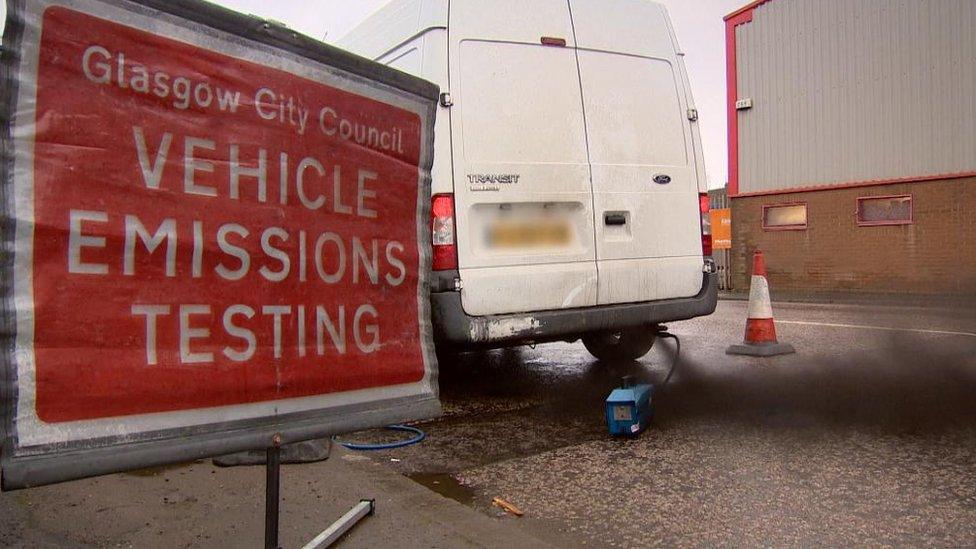
Powers designed to ensure the most polluting vehicles are taken off the road are not being used in most of Scotland's big cities.
A BBC Scotland investigation has found only 13 of the country's 32 local authorities carry out roadside emissions testing.
And that is more than a decade since the powers were introduced.
Glasgow tests about 3,000 vehicles a year but other large councils such as Dundee and Aberdeen do not test at all.
Edinburgh, which has some of Scotland's most polluted streets, has never tested - despite having the power to do so.

The councils that hold testing powers under the Road Traffic (Vehicle Emissions) (Fixed Penalty) (Scotland) Regulations of 2003
Edinburgh
East Dunbartonshire
East Lothian
East Renfrewshire
Falkirk
Glasgow
Midlothian
North Lanarkshire
Renfrewshire
South Ayrshire
South Lanarkshire
West Dunbartonshire
West Lothian

Drivers can be issued with fixed penalty notices if they fail the tests.
The fine will be waived if drivers have the emissions defect fixed before completing an MoT inspection within two weeks.
The tests are carried out on diesel vehicles by asking drivers to rev their engines and in petrol vehicles, sample probes are inserted into exhaust tailpipes.
The figures emerged following Freedom of Information requests for BBC Scotland's documentary 'Car Sick', which examines the issue of air pollution.
The programme will be broadcast at 19:30 on Wednesday.
Since 2003, councils have had the opportunity to apply to the Scottish government for the power to carry out roadside vehicle emissions tests.
But the research revealed three of Scotland's four biggest cities are not using those powers.
Glasgow was the biggest user of the powers, with 2,926 vehicles tested in 2014-15.
Edinburgh also has the power to do so but said it had never carried out roadside emissions testing.
Aberdeen no longer carries out roadside tests and Dundee has never conducted testing.
Edinburgh, Aberdeen and Dundee city councils all insist they are working hard to reduce air pollution.
The local authorities point out vehicles more than three years old are already subject to an emissions test as part of annual MoT inspections.
They highlight that traffic police also have the power to remove vehicles producing excessive smoke from the road.

What the big cities say
Edinburgh's transport and environment convener, Councillor Lesley Hinds, said: "Local authorities make use of a variety of ways to improve air quality and reduce emissions, choosing the most appropriate tools where necessary to make an impact on emissions."
Aberdeen City Council's communities, housing and infrastructure convener, Councillor Neil Cooney, said it was "not cost effective" to purchase the emission testing equipment and train officers.
He said: "Officers would use the equipment only on limited occasions and, as is done elsewhere, are not in a position to share with neighbouring authorities since they do not have air quality problems."
A Dundee City Council spokesman said: "Dundee has previously attempted to seek additional funding to pilot such a scheme and may make a further bid to do so."
Meanwhile, Glasgow's executive member for Transport, Environment and Sustainability, Bailie Elaine McDougall, said the city took its responsibility to reduce air pollution "very seriously".
She said: "We know that vehicles not properly maintained can produce air pollution at levels far higher than they should.
"One way to make sure vehicles in our city are compliant and meet emissions standards is to carry out regular roadside emission testing which we do in conjunction with the police.
"Where a vehicle fails the test the owner has 14 days to have the vehicle repaired or they have to pay a fixed penalty notice.
"While we have seen air quality improvement across most of the city, we recognise that more needs to be done."

The Scottish government said its "vision" was to ensure Scotland had the best air quality in Europe and it has argued that local authorities had a key role to play.
Yet some senior councillors told the BBC they were struggling to cope with the impact of the Scottish government's road building programme, and lacked the resources they need to make a real difference.
It is claimed Scotland spent just £3m fighting air pollution last year, while investing £700m on building new roads.
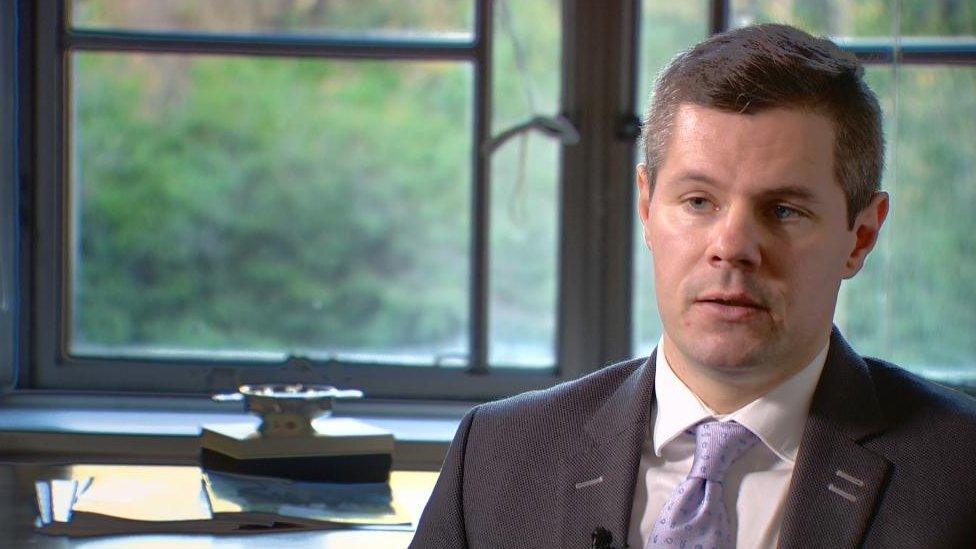
Transport Minister Derek Mackay there were a range of power that could be used
When questioned about the low uptake of emissions testing powers, Transport Minister Derek Mackay said: "I think that emissions and clean air is certainly more of a topic now than it was before, and I hope that local authorities reflect on that.
"We've had a consensual debate in parliament about actions that should be undertaken, and that now has to work its way through local government as well.
"There are a range of powers that can be deployed to make an impact locally, and I'd encourage leaders to take this very seriously."
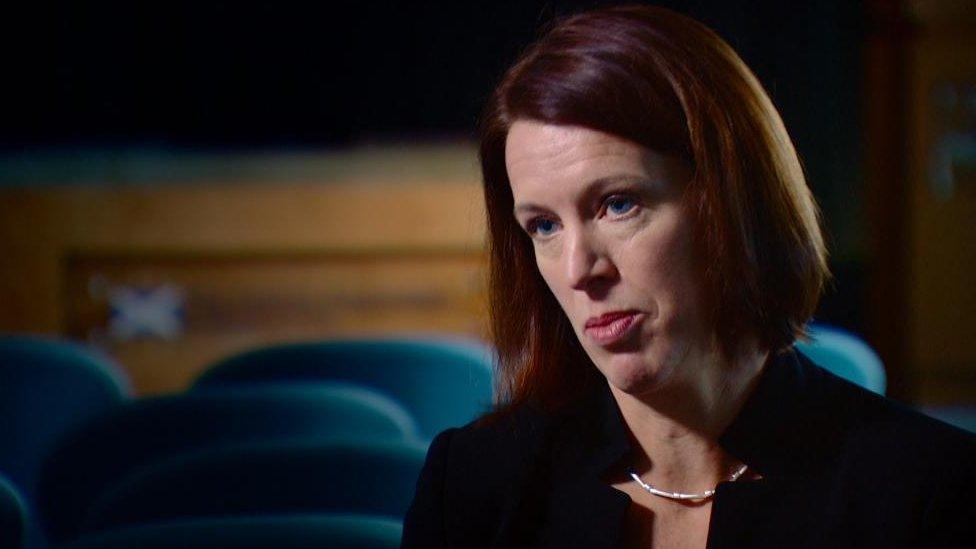
Scotland's chief medical officer, Dr Catherine Calderwood, said the consequences were wide-ranging
The documentary also hears from a range of experts about the health impacts of air pollution from traffic, coupled with low levels of physical activity, due to our reliance on the car.
Scotland's chief medical officer, Dr Catherine Calderwood, said the consequences were wide-ranging and were hitting the most vulnerable people the hardest.
"We risk increasing our rates of diabetes, we're increasing our rates of cardiovascular disease, increase in dementia, increase in depression, people feeling generally less good, less happy, less productive," she said.
"It is a priority because of course this is an inequalities issue.
"Babies, particularly pre-term babies, children with asthma, elderly people with chronic obstructive airways disease, or with angina, they will definitely have those conditions worsened by air pollution. So the most vulnerable people are being more affected than people who are generally healthier."
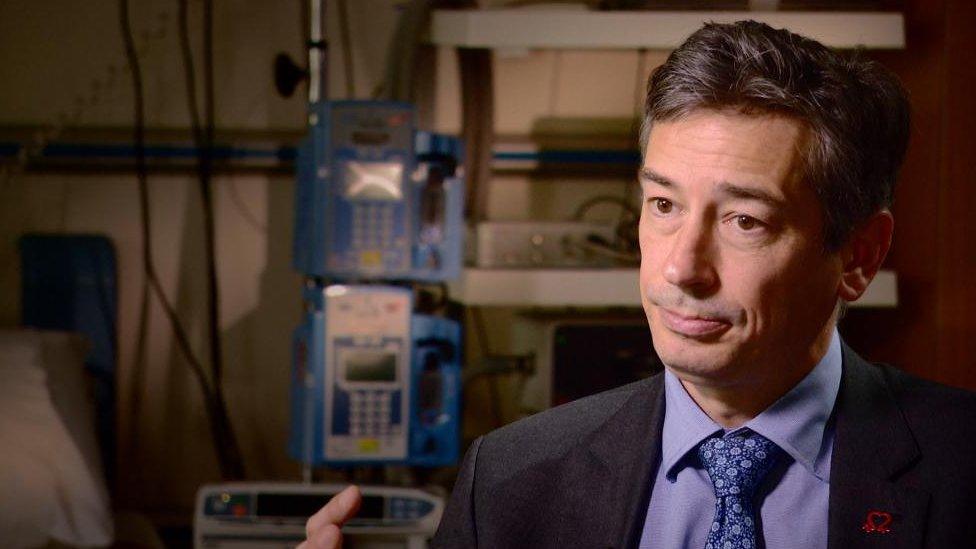
Prof David Newby has been studying the effects of pollution from traffic
Prof David Newby, a cardiologist at Edinburgh's Royal Infirmary, has been studying the effects of pollution from traffic and particularly diesel exhausts, which generate tiny particles that go deep into the lungs.
"Over the last five years or so, we have been looking at what happens when you breathe these particles into the body, and specifically what it does to the blood vessels and to the heart," he said.
"We've found that the blood vessels in the body don't react properly when you've been exposed to diluted down diesel exhausts. They don't relax as well, so they're a bit tighter and stiffer, and they tend to form more blood clots in the body.
"Both of those things are important because they're very closely associated with heart attacks.
"We've found from various studies that have looked at population level, that when there is a polluted day, you're much more likely to have a heart attack, so, it tends to trigger heart attacks. And people who live in more polluted environments have a higher incidence of having heart disease or dying from heart disease."
Friends of the Earth Scotland campaigner Emilia Hannah said air pollution was a public health crisis which was responsible for about 3,500 deaths north of the border each year. She called for action from politicians to increase active travel and tackle congestion.
She said: "Although you can't see it, air pollution is having an impact on our health.
"We have a problem with overreliance on cars, and if the Scottish government were to invest more of its money into walking and cycling paths, and into public transport, people would have more options."
When asked why just 1.9% of Scotland's transport budget was spent on active travel such as walking and cycling, Derek Mackay said: "That's the highest ever investment in active travel. It's still at a record level, and it's about behaviour change as well, it's not just about throwing money at certain projects.
"We're spending over £1bn a year on public transport, as well as investing in projects like greener buses and electric vehicles.
"We've invested in a national cycle network, as well as walking strategies."
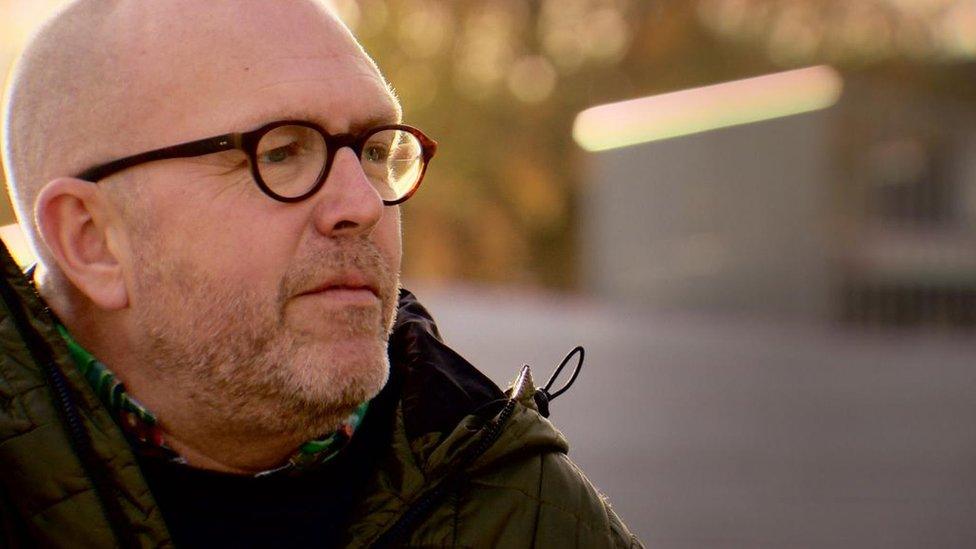
Klaus Bondam played a key role shaping Copenhagen's transport policies.
The Scottish Household Survey revealed that two-thirds of people travelled to work by car or van last year, while 13% of people walked and 2.6% cycled.
The documentary hears from cycling advocates in the Danish capital, Copenhagen, where 45% of commuters travel by bike each day.
Klaus Bondam is head of the Danish Cyclists' Federation and has played a key role shaping Copenhagen's transport policies.
He said: "Bicycle infrastructure is extremely cheap compared to the outcomes of it.
"For every kilometre that we exchange the car with the bicycle, we save the Danish society seven kroners. That's almost a pound, but it's saved the Danish society seven kroners in prolonged life and improved health effects."
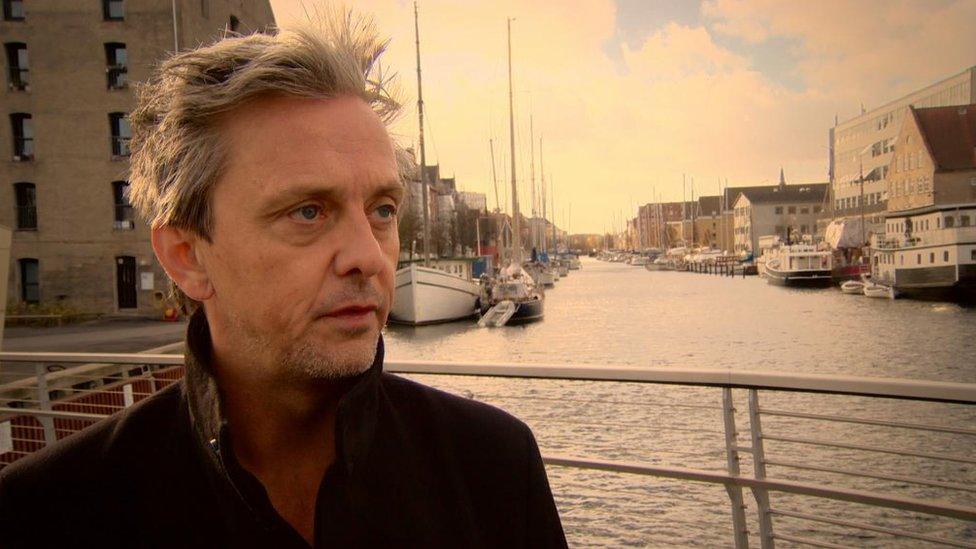
Mikael Colville-Andersen advises cities about how to establish the bike as a form of transport
Mikael Colville-Andersen runs the urban design company Copenhagenize, which advises cities and organisations about how to establish the bike as a form of transport.
"What is possible here, what has happened here in Copenhagen, taking the bicycle seriously as transport, is possible in every other city in the world," he said.
"Every city in the world used to be bicycle friendly. The bicycle was a primary transport in every city in the world, especially Great Britain.
"We all started to go car-centric - the greatest paradigm shift in transport in history in the UK and in Denmark and in the Netherlands - and what happened was in the 1970s we started to rediscover the bicycle.
"The Danish or the Dutch model, it's just simply cities that are focused on the bicycle as transport, and making the bicycle the most competitive way to get around, time-wise.
"In many, many cities in the UK it's still quicker to take the car. You have to change that paradigm. That's the only way to nudge people to do anything, is to just simply give them the fastest way from A to B. What you see here is possible anywhere."
Alison Johnstone, health and wellbeing spokeswoman for the Scottish Greens and MSP for Lothian, said: "This investigation shows yet again that public health is being paid lip service by both national and local government who remain unwilling to use their powers and budgets to make our streets safe and healthy.
"Successive Labour, Lib Dem and SNP governments have failed to take this issue seriously despite the clear evidence that investing in walking and cycling infrastructure and efficient, affordable public transport delivers much greater public benefit than building new roads."
Scottish Conservative transport spokesman Alex Johnstone said: "With detailed emissions testing now part of the MOT test, it can be argued that roadside testing is no longer the best way to pursue this matter.
"It is therefore only reasonable that cash-strapped councils should be permitted to set their own priorities according to local circumstances."